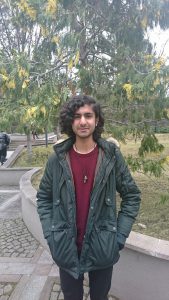Name: Hadi Khatri

Department: English Language and Literature/I
Country of Origin: Pakistan
What do you like best about Turkey?
First, there’s the abundance of culture, a rich history and many tourism sites, although I haven’t explored nearly as much as I would have liked to. Turkey is also an amazing place for photography. The people have been extremely helpful and supportive whenever required, and radiate this aura of happiness that’s lovely to be around. I also quite like the nightlife in the cities, which is much livelier than in Pakistan.
Are there any similarities between Turkey and your home country?
Loads of them, I’d say. I was quite surprised to find that our cultures have a lot in common, in terms of politics, values and so on (although Turkey is for sure a bit less extreme and more progressive). There are similarities in the cuisine as well, so the dishes here don’t feel too alien, although almost everything that I eat in the cafeteria does require a considerable dose of pul biber. I was afraid of the idea of learning a new language from scratch, but surprisingly our languages also have quite a few words in common, which makes the learning process more interesting.
What will you miss most about Bilkent/Turkey?
Regarding Bilkent, the relationships I’ve been forming, be it with the students or the professors, some of which I’d like to believe will last a lifetime. I also love the campus with all its facilities, stunning views of the city, animal friends, etc., and just being in this environment has put me in a very engaged and curious headspace. There’s always something or other to do, or someone new to meet from this bunch of interesting people with their unique passions and stories.
What’s your favorite place on campus, and why?
I guess this is a common answer, but I think it has to be the Dorm 76 hill. Getting a tea or coffee from Bilka and sitting outside with that wonderful view of Ankara has almost become a routine by now. I’ve also had some of my best experiences on the hill, such as sitting with a group and playing the guitar, or sliding down and having snowball fights when it’s snowing.
What’s your favorite Turkish food and/or favorite part of Turkish culture?
Türk kahvesi, çiğ köfte, and generally köfte and kebab, but the latter are probably because of the similarity with Pakistani cuisine. The Turkish manner of greeting (touching heads) is also fascinating.
Where do you expect to see yourself 10 years from now?
My dream would be to be settled in a cottage somewhere removed from the busy city lifestyle that I’ve experienced till now (in the mountains would be best), and writing books. But I also see myself traveling often, exploring new cultures and doing photography. Most of it sounds impossible, but one can hope.
What’s the hardest challenge you’ve handled in Turkey?
Finding the domestic terminal at the İstanbul airport, no jokes.
What cities have you visited in Turkey, and which one is your favorite?
Aside from Ankara I’ve only visited İstanbul so far, so I guess there isn’t really much choice for a favorite. But I absolutely loved İstanbul (I guess I prefer it to Ankara).
Do you have any hidden talents?
Well, there’s a question of how much I can reveal, but I think I write good poetry (sometimes; it’s more of a hit and miss). I can also sketch really well, and won a couple of tournaments a few years back, though I haven’t done it in a long time.
What’s an interesting question or comment you hear frequently at Bilkent/in Turkey?
I often hear people say “Ankara is boring.” It’s hard for me to comprehend, but maybe I haven’t seen enough of the rest of Turkey.
Describe yourself in three words.
Chill, curious, and versatile.
If you could master any skill, which one would you choose, and why?
Being able to speak multiple languages (including Turkish, of course). For me a major point of life is connecting with people, getting to know them and sharing stories with them, which is significantly hindered by a language barrier.
